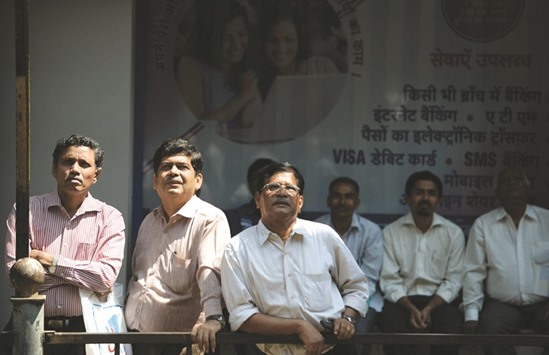Indian stocks dropped before Thursday’s expiration of monthly futures and options contracts, with the benchmark equity gauge poised to cap its first annual loss in four years.
Infosys and Tata Consultancy Services, the nation’s biggest software exporters, were the top percentage decliners on the S&P BSE Sensex. State Bank of India, the largest lender, slipped for a second day. Carmaker Maruti Suzuki India retreated the most in three weeks and Reliance Industries, owner of the world’s largest petroleum refining complex, fell for the first time in three days.
The 30-stock Sensex slid 0.5% at the close in Mumbai, after changing direction at least 15 times.
The Nifty 50 Index retreated 0.4%, with trading volume 26% below its 30-day average. The Sensex has fallen 5.6% in 2015 after the US Federal Reserve raised interest rates for the first time in nearly a decade, and as Prime Minister Narendra Modi struggled to pass reforms to accelerate the country’s economic growth.
“Some amount of volatility in and around the expiry is a given,” Vikas Gupta, an executive vice president at Arthveda Fund Management in Mumbai, said by phone. “We are seeing lower participation as the year comes to an end.”
The Sensex’s decline this year comes as Modi’s efforts to pass laws, including a national sales tax and a bankruptcy code, were foiled by a lack of majority for his party in the upper chamber of the parliament. The gauge jumped 30% in 2014, its steepest gain in five years, after his Bharatiya Janata Party came to power with the biggest electoral mandate in three decades.
Traders have replaced 54% of current month futures with January contracts, data compiled by Bloomberg show in Mumbai. Derivatives are India’s most popular market segment, with average daily turnover in futures and options this year amounting to more than 12 times that in stocks.
Infosys sank 1.7%, paring this year’s gain to 10%. Tata Consultancy Services, the nation’s most valuable company, dropped 1.5%, the most since December 22. State Bank of India and Reliance Industries each declined 1.1%.
Smaller companies have performed better than those on the Sensex this year, with the S&P BSE Midcap and the S&P BSE Smallcap gauges rising at least 5.6%. The mid-cap measure added 0.2% yesterday, while the small-cap measure gained less than 0.1%.
“With better economic growth and company earnings, 2016 should be a good year for Indian equities,” Gupta said, adding he’s recommending software exporters to clients. “We see foreign inflows returning in a big way.”
Foreigners bought local stocks for a sixth straight day on December 28, taking this year’s net purchases to $3.1bn, still the lowest amount in four years.
The Sensex trades at 15.5 times projected 12-month earnings, compared with a multiple of 11 for the MSCI Emerging Markets Index.
Meanwhile in the spot market, the rupee was little changed at 66.3875 a dollar, prices from local banks compiled by Bloomberg show. The currency has climbed 0.4% in December, the best performance in Asia excluding Japan, paring its loss in 2015 to 5%.
A gauge of expected swings in the rupee slumped to the lowest level since July on signs demand for Indian stocks is picking up as the Federal Reserve’s interest- rate increase removed a key uncertainty for investors.
Global funds have been net buyers of local equities every day since the US central bank raised rates mid-December for the first time in a decade. Overseas holdings of rupee- denominated bonds are seen rising as India grants investors access to an additional Rs165bn ($2.5bn) of sovereign and state-government notes from January 1, part of a September plan to increase foreign-investment limits in phases.
“Recent inflows to stocks, coupled with anticipation of bond purchases by foreigners, are helping the rupee,” said Anindya Banerjee, associate vice-president for currency derivatives at Kotak Securities in Mumbai. “Even as subsequent rate hikes by the Fed are seen pressuring emerging- market currencies in 2016, the rupee will weaken less given India’s improved economic fundamentals.”
One-month implied volatility, a measure used to price options, dropped 10 basis points in a third day of declines to 5.49% in Mumbai, data compiled by Bloomberg show. It has plunged 121 basis points this month.
Overseas investors bought $9.4mn more local shares than they sold on December 29, taking total purchases since December 16 to $434.8mn. Inflows for 2015 are at $3.1bn. Foreign holdings of Indian government and corporate debt have risen by Rs487bn this year, data compiled by Bloomberg show.
The yield on sovereign notes due May 2025 decreased one basis point yesterday to 7.75%, according to prices from the central bank’s trading system. It has fallen four basis points in December, after rising in each of the previous two months. The benchmark 10-year yield has dropped 11 basis points in 2015, poised for a second straight annual decline.

Bystanders watch share prices displayed on a digital broadcast on the facade of the Bombay Stock Exchange building in Mumbai. The 30-stock Sensex closed down 0.5% yesterday, after changing direction at least 15 times.
